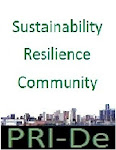by Killian OBrien January 28, 2010
Detroit: time to turn the problem into the solution |
This devastation didn’t come suddenly, but slowly, and as surely, as Katrina, but with more destruction. When the auto industry left town, they left a city. When they left their factories, they left the people. When they left, they started a slow cataclysm. New Orleans lost a couple hundred thousand people. Detroit has lost nearly a million – a slow-motion tidal wave of economic destruction. Unemployment is, and has been, far above the national average for a long time. There are no major chain grocery stores or warehouse-style stores within the city limits of Detroit, making the city a virtual food desert. Residents must either pay exorbitant prices for inferior food or travel out of the city to get decent prices and (somewhat) nutritious food. The best efforts of those building community gardens throughout the city still is but a brief shower in this desert compared to the wasteland that is this once-thriving city.
But what remains is a perfect template for rebirth: water, land, idle hands and a food desert. Detroit has the potential to become the first truly major American city that can provide a large majority of its own food, and in a way that protects the environment while reducing carbon emissions. It’s estimated that Victory Gardens provided up to 40% of all vegetables during World War II. With well-organized, intensive gardening, we can easily exceed that number. If ever Permaculture principles are to be applied on a massive scale, at a grassroots level, this is the place and this is the time.
But Detroit is not an easy city. She is wary. Many feel they have paid their dues here and look on strangers with suspicion. Long-term residents are often jaded beyond reaching. They’ve been left for dead, fooled time after time by big talk and little or no action. Consider Detroit the Show Me city. It’s not easy to come here with an idea or a plan and expect others to accept you. They won’t, by-and-large, even if they like the plan and see a buck or two hanging out of your pocket. They’ve seen both before. Of course, very few have ever heard of Permaculture, much less understand what it is. This can even be true among the “green” movement as one person said to me, “Permaculture isn’t the be-all and end-all” of agriculture. They were right. As you likely know if you are reading this, Permaculture doesn’t mean permanent agriculture, it means permanent culture. It’s not a system of agriculture, but of system design. It’s a way of designing our homes and communities so they can be sustainable and resilient. Food just happens to be a very important part of continuing to live and necessarily gets a lot of attention from anyone wanting to be self-reliant, eco-friendly, and eat fresh, healthy food grown in harmony with the rest of Nature.
Permaculture gardens in Detroit
The Permaculture and Resilience Initiative – Detroit (PRI-De) will work with others to make Permaculture an important part of the rebirth of the Motor City as the Motor of Urban Agriculture. PRI-De will be offering PDC’s with a strong urban component in recognition of the great need for urban populations to redesign their access to food and energy within the context of an uncertain future. We will be applying the funds from paying students to provide Permaculture training to local residents on a scholarship basis. We will also expand into workshops that highlight green tech and sustainability.
Recession or not, people can provide for their own needs

Hello Killian,
ReplyDeleteDeanne Bednar of the Strawbale Studio in Oxford tells me that you're offering permaculture design courses. I'm interested. Please email me with more info.
Rebekah "Rivkha" Uselman
rha.uselman@gmail.com